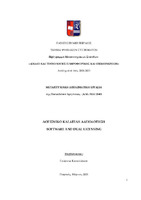Λογισμικό και διπλή αδειοδότηση
Software and dual licensing

View/
Keywords
Λογισμικό ; Διπλή αδειοδότηση ; Λογισμικό ανοιχτού κώδικα ; Open source AIAbstract
In the age of the digital revolution, software has become an integral part of daily life, affecting almost every sector of human activity, from education and healthcare to business and entertainment. The development of software is a dynamic process that is constantly evolving, with new technologies and protocols emerging all the time. In this environment, the way software is distributed and protected is of particular importance, as it affects both user access and the rights of the creators.
The issue of software licensing has emerged as one of the most critical concerns in its development and distribution. Licensing is the mechanism that allows the software creator to define the terms of use by third parties. Through licenses, the rights and obligations of users are regulated, whether the software is open-source or proprietary. A particularly interesting phenomenon in the field of software licensing is dual licensing, which offers creators the opportunity to offer their software under two different licenses: open-source and commercial. This is essentially a business model that, with its advantages, facilitates both creators and users, as well as companies, in making the most efficient use of promoting their software, maintaining not only its open nature and "open" access to all but also the financial benefits for both the companies and the developers.
The aim of this paper is to examine the framework of dual licensing, explain how it is applied in real-world scenarios, and analyze its impact on both software creators and users. Some cases that have been addressed by the courts and have played a decisive role in resolving potential ambiguities will be discussed. Emphasis will be placed on the legal and technical aspects of the phenomenon to better understand the significance of dual licensing in the modern software market. The paper will address the issues that may arise from dual licensing, specifically the incompatibilities between different types of usage licenses, and what provisions might apply in case of violation of the terms. Additionally, emphasis will be placed on potential solutions, such as the use of Artificial Intelligence algorithms and "smart contracts" through blockchain technology.


